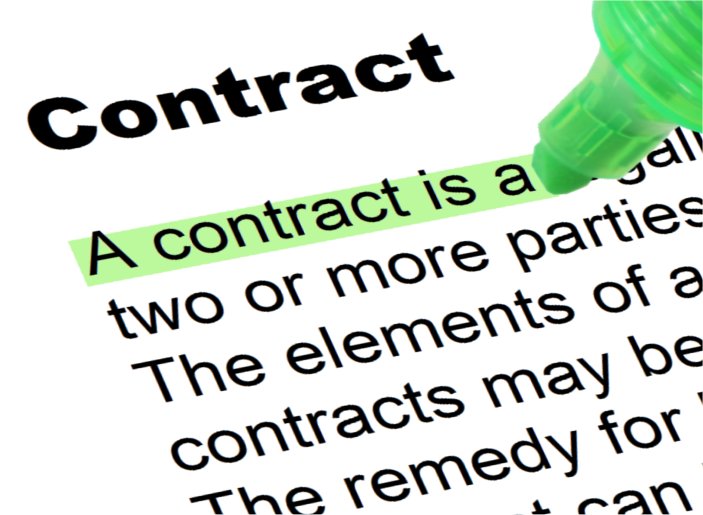- Milton Keynes 01908 660966
- Northampton 01604 828282
An agent’s rights on termination of a commercial agency are extensive. The position is governed by the Commercial Agents (Council Directive) Regulations 1993 which impose strict obligations upon both a principal and agent. Unless certain regulations are disapplied under the terms of a formal agency agreement, then the repercussions of termination can be very expensive for a principal!
What is the definition of an agent?
 In order for an agent to benefit from protection under the Regulations, they must overcome the first hurdle of satisfying the definition of a commercial agent. An agent is a self-employed intermediary who has continuing authority to negotiate the sale or purchase of goods on behalf of another person, that being the principal, or to negotiate and conclude the sale and purchase of goods on behalf of and in the name of the principal. If an agent is able to satisfy this definition, then they are by virtue of their agency entitled to receive either compensation or an indemnity payment in the event of termination.
In order for an agent to benefit from protection under the Regulations, they must overcome the first hurdle of satisfying the definition of a commercial agent. An agent is a self-employed intermediary who has continuing authority to negotiate the sale or purchase of goods on behalf of another person, that being the principal, or to negotiate and conclude the sale and purchase of goods on behalf of and in the name of the principal. If an agent is able to satisfy this definition, then they are by virtue of their agency entitled to receive either compensation or an indemnity payment in the event of termination.
Indemnity or Compensation?
Compensation is the default payment, this will apply unless the parties have opted for indemnity within the agency agreement itself. From an agent’s perspective it would be more beneficial if the contract was silent on payment in the event of termination. However, from a principal’s perspective and in order to mitigate their losses, it would be best to ensure that a formal agency agreement has been put in place to provide for an indemnity payment in the event of termination.
So how is payment calculated?
 In the event that compensation is payable, the agent is entitled to be compensated for the damage they suffer as a result of the termination of their agency. This will take account of the future income stream which is lost and by reference to the value of their agency at the time of termination. Principals take note, there is no limit to the amount of compensation that a court can award to an agent! In contrast, an indemnity payment is capped under the Regulations to the value of one year’s average annual remuneration over the last five years prior to termination, or a lesser period where appropriate. Opting for an indemnity provides a principal with certainty as to their maximum potential exposure, which is why putting a formal agency agreement in place is vital to limit a principal’s liability.
In the event that compensation is payable, the agent is entitled to be compensated for the damage they suffer as a result of the termination of their agency. This will take account of the future income stream which is lost and by reference to the value of their agency at the time of termination. Principals take note, there is no limit to the amount of compensation that a court can award to an agent! In contrast, an indemnity payment is capped under the Regulations to the value of one year’s average annual remuneration over the last five years prior to termination, or a lesser period where appropriate. Opting for an indemnity provides a principal with certainty as to their maximum potential exposure, which is why putting a formal agency agreement in place is vital to limit a principal’s liability.
So, when might a principal be entitled not to pay an agent on termination of their agency?
Regulation 18 provides for certain circumstances in which this may be excluded. This could include where the principal has terminated by virtue of a default on the agent’s behalf which justifies immediate termination, if the agent has themself terminated the agency contract (unless such termination is justified by circumstances attributable to the principal), on grounds of age, illness etc., or in the event that the commercial agent has assigned their rights under the contract.
If you are a commercial agent and require advice with regards to having your commercial agency terminated, then please do not hesitate to contact Christopher Buck in our Commercial Services Department.
Similarly, if you are a principal and require legal assistance with drafting an agency agreement so to ensure you mitigate your exposure in the best way possible, then please do not hesitate to get in touch. 01908 660966 or Christopher.buck@franklins-sols.co.uk.
Google has been issued with a hefty fine of £50 million by French regulators for General Data Protection Regulation (GDPR) violations, the highest the GDPR fine to date!
 If you are a business that processes a lot of client information, you should have already made contact with your clients to invite them to ‘opt into’ receiving emailed correspondence from you, with the deadline for implementation for the new regulations being May last year. Not only must individuals have the right to access their personal data, as and when requested, you must provide them with the reasons behind why you are processing their data, your retention periods for that personal data and who it will be shared with.
If you are a business that processes a lot of client information, you should have already made contact with your clients to invite them to ‘opt into’ receiving emailed correspondence from you, with the deadline for implementation for the new regulations being May last year. Not only must individuals have the right to access their personal data, as and when requested, you must provide them with the reasons behind why you are processing their data, your retention periods for that personal data and who it will be shared with.
Google were found to be in breach of the regulations, by not “sufficiently informing” their customers about how Google collected and processed their data to personalise advertising. The French regulators, the CNIL, stated that the lack of transparency and valid consent amounted to such a serious breach that justified the fine falling into the higher tier. This case demonstrates that the GDPR should not be taken lightly and also the importance of ensuring that your business has adequate reporting procedures in place.
Not only does the fine against Google highlight the repercussions of failing to adhere to the GDPR, it can be costly for all parties involved and reinforces the continued expectations required under the regulations.
If you require any legal advice on the GDPR and what this means for your business, then please do not hesitate to contact our Commercial Services Department who have a breadth of knowledge and expertise in the area.
A recent decision of the European Union Intellectual Property Office (“EUIPO”) has seen McDonald’s lose its right to the infamous Big Mac trade mark.
 The dispute between Supermac’s and McDonald’s began back in 2015, after lawyers for McDonald’s filed an objection against the Irish restaurant chain following its attempt to register its name as an EU trade mark. Supermac’s sought to appeal McDonald’s claim in 2017 and for the EUIPO to cancel McDonald’s rights to the Big Mac trade mark on the basis that McDonalds had not proven genuine use of it. The onus was then on McDonalds to defend the claim and evidence their use of the trade mark.
The dispute between Supermac’s and McDonald’s began back in 2015, after lawyers for McDonald’s filed an objection against the Irish restaurant chain following its attempt to register its name as an EU trade mark. Supermac’s sought to appeal McDonald’s claim in 2017 and for the EUIPO to cancel McDonald’s rights to the Big Mac trade mark on the basis that McDonalds had not proven genuine use of it. The onus was then on McDonalds to defend the claim and evidence their use of the trade mark.
Why is it important to protect your brand name
The importance of obtaining protection for your brand name by registering it as a trade mark is crucial to prevent key competitors from using it. More importantly, once it has been registered you must use it in such a manner to prevent it from being cancelled by a third party for improper use. In McDonald’s case, the EUIPO found that McDonald’s had failed to meet these standards by providing limited evidence, including affidavits from executives and printouts from Wikipedia pages. On this basis, their right to the Big Mac trade mark was cancelled. This decision will come as a surprise to many, considering how well known the Big Mac burger is and highlights how important trademarking your brand is. Not only that, but you must also ensure that you actually use it!
The Big Mac trade mark was registered in three different classes, of which McDonalds was required to prove use of all three. By failing to sufficiently evidence such use, the whole trade mark was in fact cancelled. This landmark case highlights not only the importance of registering your trade marks, but making sure that you register them under the most appropriate classes.
If you would like any legal advice on registering a trade mark, or assistance with determining which classes would be more suitable for your particular trade mark, then please contact a member of our experienced Commercial Services Department who will be happy to assist.
Salsas cease and desist letter
Salsas, a restaurant chain with more than 43 franchises across Australia, registered the “Taco Tuesday” mark in 2011.
The Mexican restaurant has now sent a cease and desist letter to the Reverence Hotel requesting that they stop using their phrase “Taco Tuesday”.
The letter read “we assume that you are unaware that Salsas is the owner of the registered trade mark Taco Tuesday in respect to the provision of the Mexican-style food and restaurant services”.
Presently the Reverence Hotel are advertising “Taco Tuesday” in a number of ways. They use the hashtag #TacoTuesday on their Facebook page, advertise “Tacos on Tuesday” on their website and Taco Tuesday is featured in the Hotel’s calendar as an event.
Salsas claims that the Reverence Hotel has infringed the restaurant’s rights and has requested they cease using the trade mark.
Trade marks in the UK
A trade mark must be individual and can include any of the suggested marks above. It cannot be offensive, descriptive of the goods or services, misleading, too common or too similar to other symbols, such as Hallmarks and flags.
Trade marks at Franklins Solicitors LLP
At Franklins Solicitors LLP, we understand the importance of trade marks and their capability in distinguishing the goods or services of one business from those of another. Our experienced Intellectual Property team can assist in protecting the trade marks for both individuals and businesses. We can also ensure that any client who has had their trade mark infringed is fully informed of their position and any options in respect of moving the matter forward; and even considering litigation. It is not just important to ensure that our clients’ rights are protected, but also to provide advice on how to ensure that the trade marks of another are not infringed. Our broad knowledge and expertise allows us to provide well rounded and tailored advice, suitable to each of our clients’ individual needs.
If you have been considering applying for a trade mark and require assistance, have concerns or queries regarding infringement or if you would like further information in relation to both registered and unregistered trade marks please feel free to contact Christopher Buck by email christopher.buck@franklins-sols.co.uk or by phone on 01908 660 966 or 01604 828 282. .
Cyber attacks
 Throughout the course of the last year, we saw a number of cyber threats and ransom driven hacks on large scale databases. In fact this time last year, the WannaCry ransomware was wreaking havoc in the NHS database, amongst others.
Throughout the course of the last year, we saw a number of cyber threats and ransom driven hacks on large scale databases. In fact this time last year, the WannaCry ransomware was wreaking havoc in the NHS database, amongst others.
In a matter of days, the General Data Protection Regulation (“GDPR”) takes effect and with it comes a host of new compliance requirements for the handling of personal data by businesses of all sizes; no matter how large or small. One concern regarding the GDPR is that it will bring with it an increase in cyber threats and the requests for ransoms. This is especially as the fines which the Information Commissioner’s Office (“ICO”) will be entitled to impose will be much greater than at present.
Some people fear that this will encourage hackers to hold data to ransom, knowing how much it is worth to a business. It is thought they may request a sum which is less than the fine which would be imposed by the ICO as a ransom in order to gain leverage and successfully benefit from the data breach. The intention is that some business may fall into this trap and be tempted to pay the lesser ransom sum, rather than a fine of up to 20 million Euros or 4% of the company’s global blood vessels turnover; as can be imposed by the ICO.
Uber ransom
 In the latter part of 2017, it was aired that Uber had been subject to a data breach which it had attempted to cover up. The breach is said to have occurred in 2016 and affected in excess of 57 million customers and drivers. Uber had failed to notify the individuals affected and/ or the regulators and actively looked to conceal the breach by paying a $100,000 ransom to the hackers.
In the latter part of 2017, it was aired that Uber had been subject to a data breach which it had attempted to cover up. The breach is said to have occurred in 2016 and affected in excess of 57 million customers and drivers. Uber had failed to notify the individuals affected and/ or the regulators and actively looked to conceal the breach by paying a $100,000 ransom to the hackers.
At the time the breach and cover-up was publicised, Uber’s chief executive, Dara Khosrowshahi, said “None of this should have happened, and I will not make excuses for it”. Were any such data breach to occur post 25 May 2018, and attempted cover up, businesses may be looking at experiencing first-hand the ICO’s new power to impose greater monetary sanctions.
What you need to do
Whilst it may be impossible for you to prevent a sophisticated breach of your system, you must put into practice and be able to show that you did everything in your power to protect the personal data that your business controls and processes. So long as you have considered everything you can and have updated your policies to protect your company, should a hacker find a flaw in a robust security system, the ICO would not be looking to impose fines on a well prepared and documented company. Hopefully however, you will not be subject to a data breach at all, either through hacking or lack of appreciation for the new law.
If you should have any queries in respect of Data Protection or your rights and responsibilities in respect of the same, please do not hesitate to contact me on 01908 660966 or alternatively at christopher.buck@franklins-sols.co.uk.
Dr Dre v Dr Dra
Dr Dre has recently lost his legal battle against Pennsylvania based gynaecologist Dr Drai. Dr Dre has unsuccessfully tried to argue that the OBGYN’s name is confusingly similar to his own and his accompanying trade mark.
In 2015, Dr Drai applied to register his trade mark: “Dr Drai OBGYN and Media Personality”. Dr Dre argued that this would cause confusion for consumers. However, Dr Drai’s trade mark has been found not to dilute the trade mark of Dr Dre and as such now stands in its own right.
Dr Drai’s trade mark comes from his own name, Dr Draion M Burch, and he prides himself in being one of the top winning health experts in America. He has published 20 books and makes public appearances whilst touring as a media personality. Dr Drai has been using the name for years and can now continue to do so with added protection.
Our assistance with trade marks
At Franklins Solicitors LLP, we understand the importance of trade marks and their capability in distinguishing the goods or services of one entity from another. We also fully appreciate the importance of protecting your rights and determining the most appropriate protection for you and/or your business.
We are able to assist in protecting the trade marks for both individuals and businesses. We can also ensure that any client who has had their trade mark infringed is fully informed of their position and any options in respect of moving the matter forward; and even considering litigation.
It is not just important to ensure that our clients’ rights are protected, but also to provide advice on how to ensure that the trade marks of another are not infringed. Our broad knowledge and expertise allows us to provide well rounded and tailored advice, suitable to each of our clients’ individual needs.
Furthermore, should you receive communications accusing you of infringing a trade mark, we are able to review the circumstances with you and provide advice tailored on your position. We can then provide assistance in the progression and resolution of the matter, whether the claims are denied, misunderstood or true.
If you have been considering applying for a trade mark and require assistance, or if you would like further information in relation to both registered and unregistered trade marks please feel free to contact me, or one of our team on 01908 660 966.
 A Contract forms the base of almost every business relationship, whether that be for the sale and purchase of goods, provision of services, or an agreement between Franchisor and Franchisee.
A Contract forms the base of almost every business relationship, whether that be for the sale and purchase of goods, provision of services, or an agreement between Franchisor and Franchisee.
The Contract between the parties outlines acts each party shall perform and the terms upon which those acts should be made. So what happens when a party fails to carry out their side of the deal? Or acts against specific terms within the Contract?
Firstly, we will look at behaviour that constitutes breach of Contract, before exploring the remedies available.
What constitutes a ‘breach’?
Simply put, if a party to a Contract fails to follow through with their side of an agreement, or goes against a term within the Contract, they could be found to have ‘breached’ the Contract. Examples include a failure to pay for goods delivered or failure to provide specific services.
What remedies are available?
There are a variety of remedies available for Breach of Contract and the appropriate remedy will depend on a number of factors, as well as the desired outcome of the injured party. Often, particularly in commercial scenarios, it is important to try and maintain the business relationship between parties so far as is practicable, to preserve reputations and ensure that the opportunity for the parties to work together in the future remains. It is therefore important to take time to consider the most appropriate remedy in the circumstances.
Damages
Damages is the most common remedy found in a Breach of Contract case and is a monetary award intended to provide a form of compensation for the injured party.
Damages are most commonly awarded for financial losses which have arisen as a result of a breach, however in rare and exceptional circumstances, can be awarded for non-financial losses, such as mental distress and loss of amenity although such awards are more common in personal injury cases.
It is important to note that the aim of an award for damages is to put the injured party into the position they would have been in, had the offending party acted in accordance with all terms of the Contract, rather than to serve as a merely a ‘punishment’ to the offending party.
Specific Performance
Specific Performance is when an offending party is ordered to carry out his positive contractual obligations, or to put it simply, do what they had agreed to do in the first place. Specific Performance would usually only be ordered if damages would not be deemed a suitable remedy in the circumstances. It must also be proven that there is a valid and enforceable Contract between the parties for Specific Performance to be awarded.
An example of when Specific Performance could be appropriate would be when a skill or profession of an offending party is so rare or specialised, it would be difficult to find another person or company to enter into a like Contract with.
Rescission
Rescission is a remedy used to set aside the Contract to restore the parties to the position they would have been in had the Contract never been entered into in the first place. The most common grounds for rescission include:
- Misrepresentation
- When a party entered into the Contract under Duress or Undue Influence
- A mistake had made by one or all of the parties as to a matter forming part of the Contract or relating to the surrounding factors of the Contract.
Contractual Liens
It is possible for a Contract to contain a clause entitling a creditor to a lien over goods or possessions in the event that an offending party (or debtor) fails to comply with their part of the Contract. If such a clause is contained within a Contract, the Creditor would have the rights to seize certain goods which have been provided to the Debtor, to make up for the lack of payment for said goods.
Arbitration Clauses
Often a Contract will contain an Arbitration or similar clause stating that the parties must attempt a suitable form or Alternative Dispute Resolution (“ADR”), prior to pursuing the other party for any alleged breach of the Contract. Failure to make reasonably steps to attempt ADR in the first instance could constitute a breach of Contract in itself and it is therefore important to identify and comply with such a clause.
Limitation Period
If an injured party wishes to pursue an offending party for breach of Contract they must do so within a period of six years from the date on which the breach occurred, or from the earliest date upon which the injured party could reasonably have become aware that such a breach has occurred. It is important that such limitation periods are diarised to ensure that an opportunity to pursue any potential Claim is not lost.
We are here to help
Our Dispute Resolution Department has vast experience with Breach of Contract disputes including disputes regarding Share Purchase Agreements, Franchise Agreements and Misrepresentation.
Should you have any queries or concerns in relation to a potential Breach of Contract whether relating to a Commercial Agreement or an Individual Contract please do not hesitate to contact us on 01604 828282 or litigation@franklins-sols.co.uk.
The right to be forgotten
The right to be forgotten is essentially being entitled to having actioned your request to have your personal information removed from the search engine. The latest Google transparency report has confirmed that 89% of such requests are made by individuals.
Google’s previous stance
Previously, Google has objected to requests for the erasure of information. This has been on the basis that the EU policy is not seen to be intended to “re-write history” or “tailor your past”. As such, Google has previously been reluctant to remove personal information, in particular in relation to convictions.
Recent case
In a recent erasure case regarding a man who was convicted over 10 years ago of conspiracy to intercept communications, Google’s attorney adopted the above stance, expressing that “you may have rehabilitated, but that doesn’t mean you can pretend your conviction doesn’t exist”.
In this case, the Judge has ruled that due to the actions of the plaintiff being relatively minor and him showing remorse that he should be afforded the right to be forgotten. This decision is likely to effect a precedent in respect of future cases concerning convictions being provided by search engines. It is likely that there will need to be considerations made in respect of such requests and the seriousness of the crime.
If you would like further information in relation to e-privacy or data protection, please do not hesitate to contact me on 01908 660966 or christopher.buck@franklins-sols.co.uk.
 With a little under a month until the General Data Protection Regulation (“GDPR”) becomes law in the U.K., we again outline the who, what, where, when and why to help you to achieve compliance and continue not to fall foul of the Regulation after its implementation.
With a little under a month until the General Data Protection Regulation (“GDPR”) becomes law in the U.K., we again outline the who, what, where, when and why to help you to achieve compliance and continue not to fall foul of the Regulation after its implementation.
Who the GDPR applies to?
The GDPR will apply to all entities, whether big or small, who deal with the personal data of individuals. Regardless of whether a business has 1 employee or 1,000 employees, the GDPR is intended to be a ‘one size fits all’ Regulation, with the same implications, same requirements and same fines being placed on everyone.
What you should be doing?
You should not be putting off getting your systems, staff and procedures brought up to date with the GDPR as otherwise you may find yourself liable to pay a large fine. If you are not sure where to start, our Intellectual Property team at Franklins are here to assist and we would suggest the following considerations in respect of what you could and should be doing ahead of 25th May 2018:
- Identify the personal data you hold e.g. in respect of clients, customers, staff etc.;
- Undertake an impact assessment to identify what further steps you may need to take;
- Determine whether the consent you have obtained in respect of personal data is compliant with the requirements for consent under the GDPR;
- Review your company’s policies and systems in respect of the handling of personal data, data you receive from other parties and when you pass data on to third parties; and
- Ensure you have fair processing policies which are reflective of how long you really need to keep certain types of data for.
Where you can look for help?
If you need assistance, regardless of what stage you are at in preparing for the GDPR, Franklins Solicitors, and our Intellectual Property team in particular, would be delighted to assist you.
When you need to make changes by?
One of the misconceptions surrounding the GDPR is that there is a ‘grace period’ after implementation. It is imperative that you understand that this is not the case. The GDPR will become law as of 25th May 2018, any business not compliant with the regulatory requirements after this date will be subject to the much harsher fines of up to 20 million Euros or 4% of annual global turnover. Regardless of Brexit, we will all need to comply with the GDPR come the 25th of May.
Why does this apply to you?
The GDPR is intended to streamline data privacy laws throughout Europe. It is hoped that it will lead to a clearer recognition of when consent is required and what individuals are consenting to whilst having the option to withdraw consent as easily.
If you should have any queries in respect of Data Protection or your rights and responsibilities in respect of the same, please do not hesitate to contact me on 01908 660966 or alternatively at christopher.buck@franklins-sols.co.uk.
On 1 December 2017, the supermarket Morrisons was found vicariously liable for the actions of a disgruntled employee, who posted personal data of almost 100,000 employees on a file-sharing website.
 The claim was brought by over 5500 employees and is indicative of the potential group litigation claims that companies could increasingly face when the General Data Protection Regulation (GDPR) comes into effect in May 2018.
The claim was brought by over 5500 employees and is indicative of the potential group litigation claims that companies could increasingly face when the General Data Protection Regulation (GDPR) comes into effect in May 2018.
The employees of Morrisons found that their names, dates of birth, addresses, National Insurance numbers as well as their bank sort code and account details had been posted on line. The source of the leak was a senior IT auditor, who had access to the data via a USB stick whilst being tasked with the job of delivering the details to external auditors.
The individual had faced a disciplinary issue and harboured a grudge against Morrisons. Whilst the individual was arrested and convicted for 8 years for offences under the Computer Misuse Act 1990 and the Data Protection Act 1998, it is the claim by the employees against Morrisons that has been of particular interest to the business community.
The employees allege that Morrisons was:-
- Vicariously liable for the actions of the IT auditor as its employee;
- Directly liable, for breach of statutory duty under section 4 (4) of the Data Protection Act 1998 and under common law for the misuse of personal data and breach of confidence.
It was argued that Morrisons remained the data controller at all times and the uploading of the personal data onto the web had not only shown that Morrisons had failed to take measures to prevent personal data being processed in an unlawful manner but also that it was in breach of a number of clear principles relating to the processing of personal data. The Court’s decision can be split in two; firstly how the court addresses the direct liability and secondly, the vicarious liability of the supermarket.
Morrisons was found not directly liable for the data breaches. Whilst it was accepted that Morrisons were the data controllers of the original information, the Judge found that when the data was copied onto the USB stick, the employee became the data controller.
What steps were taken by Morrisons to prevent a data breach?
The steps taken by Morrisons to prevent the processing of data were also considered and it is evident that the facts of each case will be key to future decisions. The USB stick had been encrypted and the transmission of data to the external auditors in this manner was not thought to be unreasonable. The Judge also felt that whilst the employee had been subject to a prior disciplinary process, it was not at a level to deem it inappropriate to pass on the responsibility of delivering the data in those circumstances. The Judge therefore decided that Morrisons had taken appropriate technical and organisational measures to prevent the unauthorised or unlawful processing of personal data.
However, the question remained as to whether Morrisons was vicariously liable for the employee’s actions and this was determined upon whether those actions were “sufficiently closely connected” to his position at Morrisons.
On this point, the Judge found Morrisons was vicariously liable. The reasons for the decision were based upon the following:-
- Whilst the loading of the file had taken place outside office hours and its premises, there was “an unbroken thread that linked his work to the disclosure: what happened was a seamless and continuous sequence of events”.
- Further, the IT auditor had been enTrusted with the data being instructed to store the data and disclose it to a third party. Whilst he did not do what he was authorised to do, it was closely related to the task he had been asked to perform.
The employee’s intention had been to bring Morrisons into disrepute although in doing so he had harmed a large number of employees. The Judge explained: “the issue is not so much at whom the conduct was aimed, but rather upon whose shoulders it is just for the loss to fall.”
Whilst there may be some comfort from the finding that Morrisons was not directly liable, the case confirms that liability will be limited to instances when the data breach is sufficiently connected to the individual’s employment. There must therefore be a close connection between the task assigned to the individual and the breach.
Risk assessments and careful consideration of data management, control, access and responsibility within an organisation remain vital in an environment where data security incidents remain on the increase and the trend may only accelerate once the GDPR comes into effect in May 2018.
Could the supermarket have done more? You decide.
For further advice and assistance please contact our Private Client Team on 01604 828282 / 01908 660966 or email info@franklins-sols.co.uk












